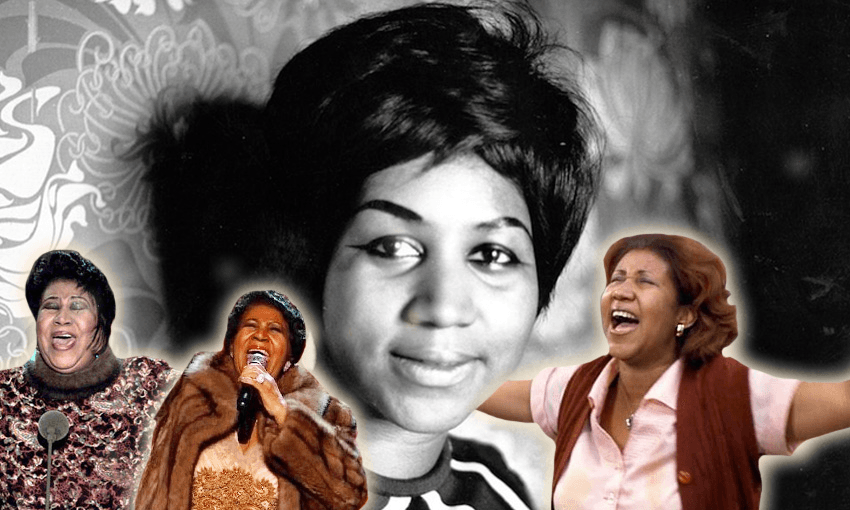Aretha Franklin has died. Sam Brooks remembers the Queen.
She wasn’t just the Queen of Soul. Hell, if you applied the label, Queen of R&B to her, you wouldn’t be wrong there either. Queen of Gospel? Sure. Queen of Pop? Of a certain era, absolutely. But what Artha was outside of these things is a vocalist, and an artist, who had an interpretive skill that can only be described as genius.
Aretha’s biography and list of achievements don’t really encapsulate what she gave to music, and what music took from her. Since the start of her career in 1960, she’s won eighteen Grammys, had seventy-five million records sold worldwide and was the first female inductee into the Hall of Fame. She’s groundbreaking, she’s been called one of the best vocalists of all time, and the appreciation for her name has far eclipsed appreciation for her talent – like any genius who is heralded within their own time.
We don’t often call vocalists genius in the same way that we call instrumentalists genius. For some reason, we think that singing comes easily to people. Either you have it or you don’t. A voice is a gift from above, either in the spiritual sense or in the family tree sense. This is a mistake. When I talk of genius in a vocalist, I’m thinking of someone like Maria Callas performing La Mama Morta, or on the complete otherside of the spectrum, Mariah Carey’s ‘Vision of Love’ during her MTV Unplugged 1990 set. Two artists who knew their voice so well, knew their music so well, and how to deploy both for maximum effect and artistry.
I would say that Franklin occupied a mid-point between Callas and Carey. Franklin had a sharp rasp of a voice that somehow never undermined the fullness of her tone, it’s instantly recognizable and full of character, regardless of what genre she’s singing. The moment she opens her mouth, you know it’s Aretha Franklin singing. That’s the mark of a pop star, and a genuine icon. There are very few people who hold the place of popstar, icon and genius. Franklin was one of them.
She could do musical theatre, as in with Bill Clinton’s inauguration:
She could do opera, most famously when she filled in for Pavarotti singing ‘Nessun Dorma’ at the Grammys at a moments notice, and sang it in his key, in a clip which appears to sadly have disappeared from the internet this week. You can see another performance of her singing the opera aria here, though:
https://www.youtube.com/watch?v=3gCuyrKVDCs
She could even outsing a well-in-her prime, Mariah Carey, not that it could have ever been a competition:
As with any unquestionable talent, the talent becomes taken for granted and the stories become less about that talent and more about the eccentricities. We accept her talent as incredible, and in that accept we actually forget the reality, the sound of someone who is incredible. Her feud with Patti LaBelle, her comments on Taylor Swift, even her removing her full fur cape before settling into a performance of ‘Natural Woman’ that would shame anybody half or a quarter of her age:
https://www.youtube.com/watch?v=XHsnZT7Z2yQ
It’s not that we didn’t appreciate Aretha Franklin. She has enough Grammys, enough records, and enough honorary ‘Queen of’ titles to cement her gilded place in the history books. It’s that we didn’t, and don’t appreciate her enough. There’s an artist outside ‘Respect’, still one of the most barnstormiest-stormers of pop history, there’s a singer deeper of ‘I Say A Little Prayer’, which fills your veins with red blood cells just by listening to it, and there’s an icon that went beyond ‘Natural Woman’, which is as warm as a hug from your own mother.
I could leave you with any one of a dozen YouTube videos that shows you how great she was. You can find those on your own, though. A hundred other pieces like this one will have them for you, and you should watch them all. But the one I’m going to leave you with is a recording of ‘The Dark End of the Street’, a little known but oft-covered song by James Carr. Franklin’s cover of this song is so obscure it’s not even on the Wikipedia entry for the song. It’s from 1970’s This Girl’s In Love With You, which is pretty much just a covers album that includes her more notable covers of ‘Let It Be’, ‘Son of a Preacher Man’ and, most famously, ‘The Weight’.
It’s not like anything else she ever recorded, as far as I can tell. Franklin was only 28 when it was recorded, but her voice in this song – about a woman who had an affair with a married man – carries a weight and a pain that far exceeds her years. She conveys the myriad conflicted emotions that this, frankly quite beautiful, song holds in each line – the shame, the pride, and the wistful longing for someone you know you love but know you shouldn’t. It is a literary, and beautiful song, but one that could be quite boilerplate with another singer (and quite frankly has been quite boilerplate with other singers).
What Aretha does is she exceeds the song. She fills out the murky corners of it with emotional life and a pained reality. It’s all in the genius of her voice, and it’s a prime example of what Aretha did, what she did throughout her entire career.
She exceeded.



